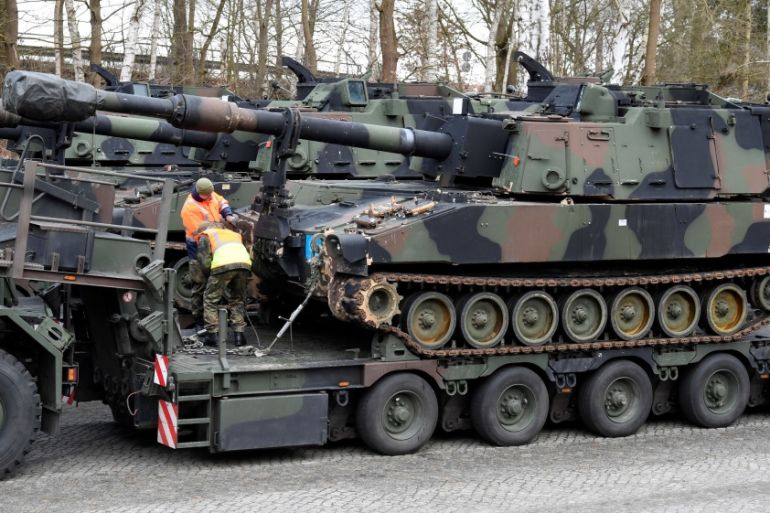Is the US heading to the front lines of European defence?
The US-led Defender Europe exercise involves 20,000 US troops, more than those of all its NATO allies put together.

Athens, Greece – In contrast to its ongoing redeployment of forces in the Middle East, the United States appears to be surging to the fore of European defence.
The US-led annual Defender Europe exercise, which is months long and lasts from February until July, will involve 20,000 US troops – more than those of all its NATO allies put together, and more than at any time in the past quarter-century.
Keep reading
list of 3 itemsIs NATO about to become ‘more involved’ in the Middle East?
New Russian weapon can travel 27 times speed of sound
“The overarching goal of the event is to demonstrate the ability of the US to lift and shift a division-size force over long distances,” said Tod D Wolters, NATO’s Supreme Allied Commander Europe earlier this month. “The planning in itself is deterrence,” he said.
Defender Europe will involve army, navy and air force exercises across eight European countries stretching to the European Union’s eastern border with Russia.
Although US officials do not say it is designed to counter a Russian threat, the demonstration of US force capability comes after years of piecemeal reinforcements of NATO’s eastern flank following Russia’s annexation of Crimea in March 2014.
At the 2016 NATO summit in Warsaw, allies agreed to deploy four multinational battalions to countries at risk of a Russian invasion.
Called the Enhanced Forward Presence, the forces are stationed in Estonia, Latvia, Lithuania and Poland.
Last September, Romania announced it would spend 2.5 billion euros ($2.7bn) to rebuild the Mihail Kogalniceanu airbase to house 8,000 to 10,000 troops, F-16s, refuelling aircraft and other assets.
Since the annexation of Crimea, it has operated as a US forward base, launching air patrols over the Black Sea.
The following month, US Secretary of State Mike Pompeo signed an enhanced defence pact with Greece.
One of its provisions is that US forces are to build a new navy and air force base in Alexandroupoli in northeast Greece, which will supply NATO allies Bulgaria and Romania.
That route bypasses the Bosphorus, controlled by Turkey, suggesting that the US is looking for alternative routes.
Greece is the beneficiary of the deteriorating US relationship with Turkey, whose dependability as an ally many US diplomats, congressmen and military leaders have begun to question.
Not only do the two disagree on using Kurdish militias at the front lines of the war against the ISIL (ISIS) group in Syria; the US sees the purchase by Turkey of Russian S-400 surface to air missiles as a breach of alliance.
“Once a dependable democratic ally, Ankara is increasingly a pro-Russian autocracy with ambitions for greater regional influence, and possibly even predominance,” recently wrote former US ambassador to Turkey Eric Edelman and General Charles “Chuck” Wald in a joint article that called for giving Greece a more pivotal role in US regional deployments.
“We have staging areas much closer [than other EU members] to the Middle East, which is obviously a flashpoint, but it means [the US] can withdraw assets from the areas themselves and keep them on a standby basis, if and when things allow,” Efthymios Tsiliopoulos, analyst at Defence-point.gr, told Al Jazeera.
“They still need to be in-area, in the region, so they can be easily deployable.”
The US is also pursuing Russia through energy. Greece will import more than 60 shipments of mostly US liquefied natural gas (LNG) this year. Some of that capacity is bound for the Balkans, where the US hopes to break a traditional Russian gas monopoly.
Greece is the only country in southeast Europe with an LNG terminal, and two more are planned.
It is now building a new pipeline to take 5 billion cubic metres of LNG into Bulgaria and beyond. Croatia will eventually be the US’s other main entry point, with three LNG terminals under construction. Another three are being built in Poland, which has flatly refused to take any Russian pipeline gas.